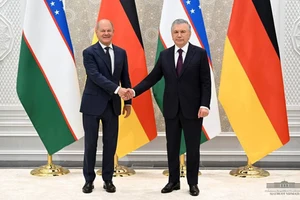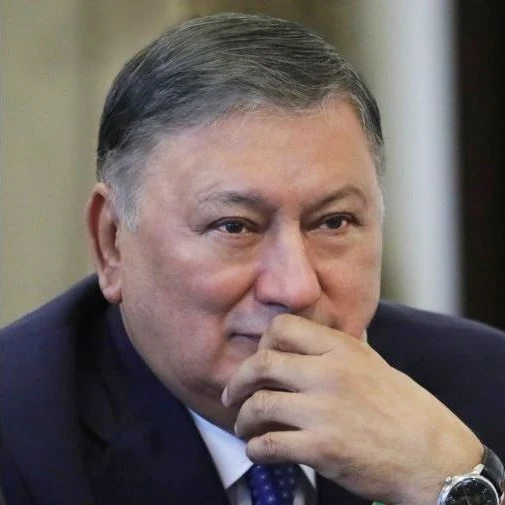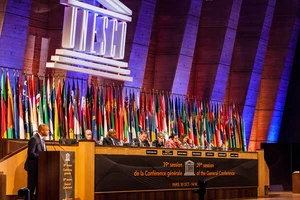Strengthening the rights of citizens in the area of freedom of receiving and disseminating information in the new Uzbekistan[Over]  Karine Javakova,
Karine Javakova,
Head of the Department of State and Legal Disciplines and Ensuring Human Rights of the Academy of the Ministry of Internal Affairs of the Republic of Uzbekistan, Doctor of Philosophy, Professor
Uzbekistan has created a solid legal framework to ensure freedom of speech and information, as well as the development of the media, improvement of the legal basis for the activities and protection of the professional rights of journalists. Considering that the liberalization of the information sphere and its development are priority tasks in the construction of the New Uzbekistan, after the constitutional reform, the articles devoted to these rights were significantly expanded. READ MORE
- Monday, 14 October 2024, 10:44
New Uzbekistan: human rights and parliamentary elections[Over]  A.Kh. Saidov,
A.Kh. Saidov,
First Deputy Speaker of the Legislative Chamber of the Oliy Majlis of the Republic of Uzbekistan, Director of the National Center of the Republic of Uzbekistan for Human Rights
The modern economic and democratic systems are designed to uphold the rights and freedoms of every individual. As is widely acknowledged, there is no universal model for democratic development; it must evolve based on each country's unique conditions and the needs of its people, avoiding rigid formulas. READ MORE
- Tuesday, 8 October 2024, 13:45
Important Migration Agreement Signed Between Uzbekistan and Germany[Over]  On the invitation of President of the Republic of Uzbekistan, Shavkat Mirziyoyev, Federal Chancellor of the Federal Republic of Germany Olaf Scholz arrived in Uzbekistan for an official visit on September 15. On the invitation of President of the Republic of Uzbekistan, Shavkat Mirziyoyev, Federal Chancellor of the Federal Republic of Germany Olaf Scholz arrived in Uzbekistan for an official visit on September 15.
In recent years, labor migration has emerged as a promising area of cooperation with Germany. At the same time, multifaceted and mutually beneficial relations in the field of healthcare are also developing consistently. READ MORE
- Monday, 7 October 2024, 14:10
The state and civil society in New Uzbekistan are consolidating efforts to combat corruption[Over]  Umida Tukhtasheva, Umida Tukhtasheva,
Deputy Director of the Anti-Corruption Agency of
the Republic of Uzbekistan, LL.D., Professor
Over the years of independence, the role of civil society in Uzbekistan has become increasingly important. The representatives of civil society are not only involved, but also actively take the initiative in the life of society and the state. This role has manifested itself more and more clearly in the fight against corruption. There is no doubt that corruption and society are incompatible. The prerequisite for a prosperous society is a life free of corruption. And all the necessary foundations must be laid for this, which is primarily the task of the state. READ MORE
- Monday, 30 September 2024, 16:03
New powers of the parliament of the New Uzbekistan[Over]  Akilov Alimjon Rakhimovich, Akilov Alimjon Rakhimovich,
Chief Researcher of Department of analyzing the effectiveness of constitutional construction and public administration of Institute of Legislation and Legal Policy under the President of the Republic of Uzbekistan, doctor of legal sciences, professor
The year 2016 for Uzbekistan was marked by the beginning of a fundamentally new in essence and content stage of state and social construction, in which the main strategic goal was proclaimed - the construction of a New Uzbekistan, based on the values that served the greatest flourishing of our statehood in the 9th-10th centuries (known in world history as First Eastern Renaissance) and XIV-XV centuries (Second Eastern Renaissance). As in previous periods, the basis and priorities of the Third Renaissance of our statehood are the development of science and modern technologies, which are intended to become drivers of dramatic development of the country’s economy, a radical improvement in the well-being of the people and the prosperity of the nation. READ MORE
- Friday, 30 August 2024, 18:16
The awakening lion: the era of renewal[Over]  Hey, great Turan, land of lions! Hey, great Turan, land of lions!
What has become of you? What are these days you endure now?
Oh, glorious cradle of Genghis, Timur, Oghuz, and Attila!
Where have the esteemed seats you once held gone?..
Abdurauf Fitrat
An American politician once said of the current life and fate of the Central Asian region: ‘They are neither post-Soviet nor post-communist countries now’.
Today no specialist knowledge is needed to understand this idea, which suggests that such labels are outdated in the research community. For example, ten to fifteen years ago the political behaviour of Central Asian societies – neighbours for thousands of years – was prone to national separatism, mutual dislike and latent hostility, but today they have undergone a remarkable transformation. Ideologues and ordinary Central Asians only a couple years ago endeavoured to prove their superiority, their antiquity and, for these very reasons, their greater belonging to the historical and cultural heritage of the region. Though they still might hurl some sharp insults at each other, now they have become united neighbours.
READ MORE
- Wednesday, 21 August 2024, 07:42
UNESCO General Conference to be held in Samarkand, Uzbekistan[Over]  The 43rd UNESCO General Conference is scheduled to take place in Samarkand in 2025. The 43rd UNESCO General Conference is scheduled to take place in Samarkand in 2025.
This marks the first time Uzbekistan will host the biennial event. Historically, these conferences have primarily been hosted at UNESCO's headquarters in Paris since 1986. However, there have been eight exceptions, with meetings held in cities like Mexico City (1947), Beirut (1948), Florence (1950), Montevideo (1954), New Delhi (1956), Nairobi (1976), Belgrade (1980), and Sofia (1985).
READ MORE
- Saturday, 17 August 2024, 08:42
Uzbekistan’s bold steps towards WTO membership[Over]  Qodir Djuraev, Qodir Djuraev,
Vice Chairman, Committee for International Affairs and Inter-parliamentary Relations, Legislative Chamber of Oliy Majlis of the Republic of Uzbekistan
The World Trade Organization (WTO) is the world’s largest and most influential trade and economic organization, renowned for its capacity to provide a comprehensive legal system for international trade. Critical documents enacted by the organization place responsibility on member states to conduct trade policy according to commonly agreed criteria. The aim is to help producers, exporters, and importers of goods and services operate successfully in the global market. READ MORE
- Friday, 9 August 2024, 08:34
|
|